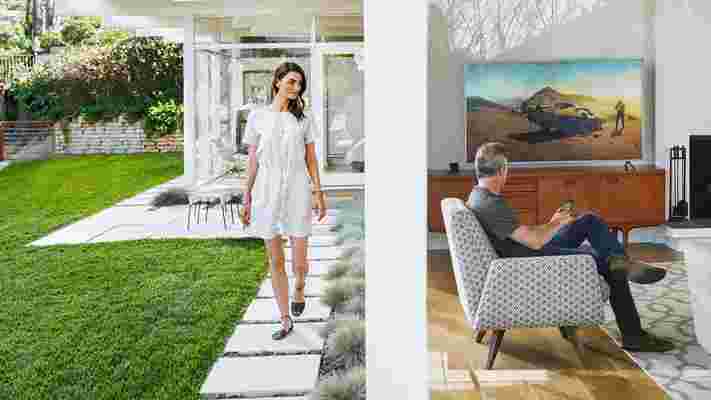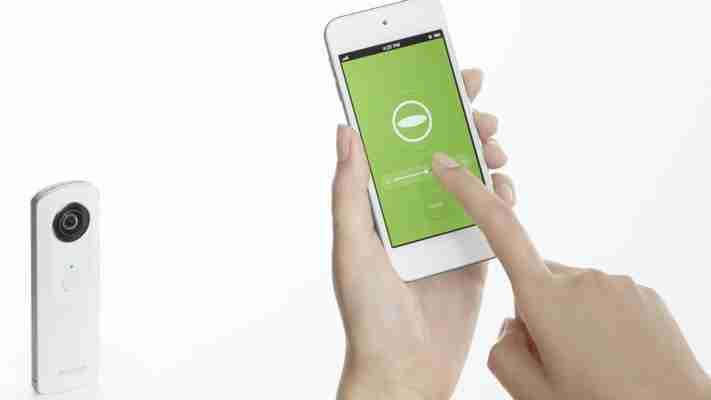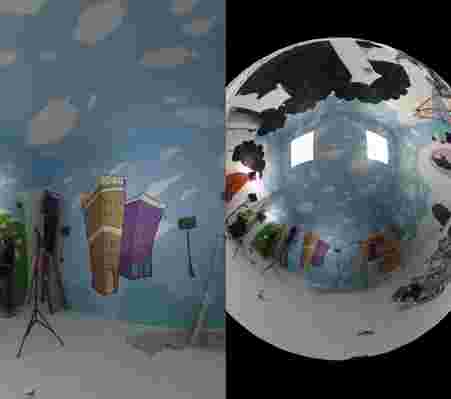CES has three evening events to showcase items you’ll see on at least one of the show floors. The second one is Pepcom’s Digital Experience which hosts a themed event. This year the theme was the 80s.

And while some of the devices on display have probably been vaporware since the time that day-glo ruled world, we’re pretty sure we found six items that stood out.
4 Moms
Ever try to fold up a stroller? You might as well attempt heart surgery on an unsedated cat. Things are sticking out everywhere and eventually you get hurt. The 4 Moms folks have created an automated solution that not folds up but also unfolds with the twist of know and push of a switch.
The Origami Stroller has onboard generators, a smartphone charger, cup holders and an LCD display, and will be available late 2015. Basically, it’s better than your first car.
Ditto
Okay, stay with me here. The Ditto is a notification device that you pair with your iOS or Android device. It vibrates when a pre-selected contact is trying to get a hold of you. Now if you’re thinking, “Hey, my smartphone already vibrates.” Yes, but this little device has a four to six month battery life and is waterproof. If you’re swimming, in the shower, charging your device or just hate having to walk around the house with your smart phone the Ditto can be clipped to your clothing and you’ll always know when that someone special is trying to get a hold of you.
The device also acts as a digital leash and will alert you when you leave your phone behind. The Ditto will be shipping soon and will set you back $39.95.
LG G Flex 2
It’s the year when everything at CES has curves. LG isn’t about to give up on making you get the curved Android phone you deserve and has announced the second generation of its bent phone with the new LG G Flex 2 . The new phone is powered by the Qualcomm 810 processor with 2GB of RAM and has gotten positive initial reviews. So yeah, it’s pretty cool if you’re into that sort of thing.
Parrot Pot
Maybe you’re going on vacation. Maybe you’re bad at keeping your plants alive. Whatever shade of green thumb you have, the Parrot Pot and H20 are the ultimate connected home way to water your plants. While the Pot actually holds your plant in its technologically advanced arms, the H20 works with a water bottle to water your plants exactly when they need it.
Both devices measure the minerals in the soil, the humidity, the temperature and of course the moisture of the plant. A companion app features a plant database that helps the watering machines determine how much your plant actually needs. No word on release or pricing yet, but for hard-core plant lovers, this could your way into the connected home.
Scanadu Scanaflo
Urinanalysis is hot! Well, more lukewarm, but the Scanadu Scanaflo can used to determine various health ailments and can be used to check in on an ongoing health problem like kidney disease or if something new is amiss like dehydration or a urinary tract infection.
The companion app scans the disposable paddles and displays the results of 12 reagents. The results can be shared with doctors via the app and you can get a professional option on what’s going on in your body without getting blood drawn or heading to the doctor’s office.
Lyve Home
As we take more and more photos, wrangling all of those photos has become nearly impossible huge hassle. The Lyve Home and its companion apps consolidate all your photos in their original resolution into a single library. It even removes duplicates. The drive houses a 2TB drive that has a screen that shows you the highlights of your life.
The drive and service work on Windows, OS X, Android and iOS. In addition, the Lyve Home connects to your network so you can see your photos not only on other devices in your home, but also when you’re out in the world and you want to share that perfect photo with friends.If you’re an avid photographer, the $299 solution to the biggest task — organizing all those photos — might be worth it.
Vizio fined $2.2 million for watching you watch TV
As if it wasn’t enough that your phone and browser are constantly capturing information about you, you now have to worry about your TV as well.

Home entertainment hardware maker Vizio has agreed to pay $2.2 million to settle a lawsuit brought by the US Federal Trade Commission over charges that the company installed software on 11 million of its smart TVs to collect viewing data without informing customers or seeking their consent.
In addition, it also gathered each household’s IP address, nearby access points, and zip code, shared that information with other companies to target ads towards Vizio TV owners.
From here on out, Vizio will have to disclose any data collection practices it engages in and secure permission from TV owners. It’ll also have to delete the data it gathered.
To see if you’re still being spied on, go to your Vizio TV’s settings menu and look for information about automated content recognition (ACR) – you’ll want to turn off any options listed under this.
In a statement, Vizio said that its data collection program “never paired viewing data with personally identifiable information such as name or contact information,” and that it used that information “in the ‘aggregate’ to create summary reports measuring viewing audiences or behaviors.”
Thankfully, that’s all it was – but it could’ve been far more intrusive, and customers would never have known. What’s more, that information could’ve requested by government and law enforcement agencies, or even stolen by hackers.
What’s worrying is that Vizio engaged in this shady business even though it’s already making money from the sale of its TVs. It seems like there’s simply too much money to be made from selling data about consumer behavior for companies to stop and think about whether they’re respecting their customers’ rights to privacy.
While the fine isn’t exactly a huge amount for a large company like Vizio, hopefully the case will serve to remind other hardware makers that it’s not okay to snoop on customers without their consent. Hopefully.
Ricoh launches $399 Theta camera bringing fully spherical images in a single shot

Ricoh has launched a small $399 camera that can capture fully spherical pictures in a single snap, called the Theta. It’s due to go on sale from October.
To achieve the full effect, the Theta has a twin-lens folded optical system that captures around, above and below the device. Weighing just 95 grams means it’s certainly light enough to throw into your pocket or bag. It has 4GB of memory, which is around 1,200 snaps.
The device also syncs with smartphones, meaning pictures are viewable via an app (iOS only currently but Android is due before the end of the year) and ones that you choose to upload to theta360om can then be shared across the usual line up of social networks.
➤ Ricoh


